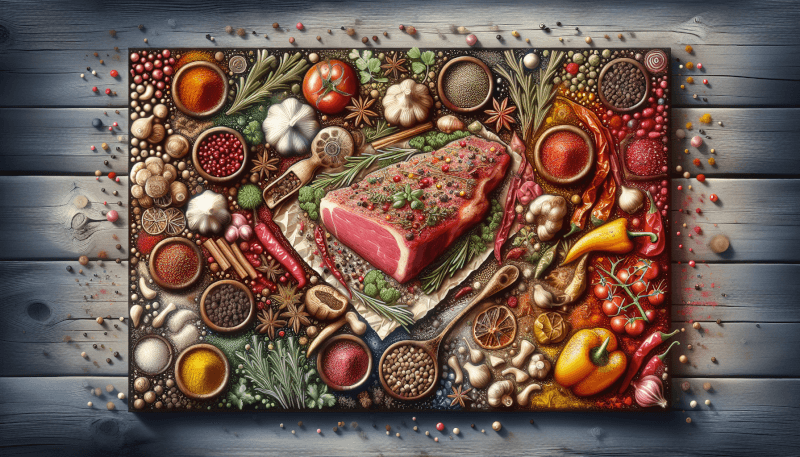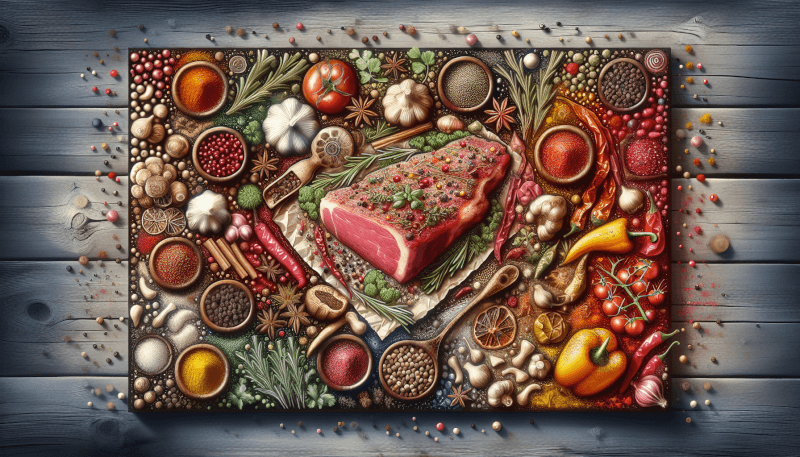If you’re like most people, then you probably love adding flavor and zest to your meat dishes. But sometimes, knowing which spices and herbs go well with different types of meat can be a challenge. Luckily, there’s no need to fret! In this article, we’ll give you a rundown of some fantastic spices and herbs that will take your meat dishes from ordinary to extraordinary. So get ready to tantalize your taste buds and elevate your cooking game with these delicious additions.

Seasoning Meat with Spices and Herbs
When it comes to cooking meat, using spices and herbs can take your dishes to a whole new level of flavor. Whether you’re grilling, roasting, or marinating, the right combination of spices and herbs can elevate the taste and aroma of your meat. In this article, we will explore the various ways to season meat using spices and herbs, as well as provide recommendations for different types of meat and specific cuts. So, let’s dive in and discover the wonderful world of seasoning meat with spices and herbs!
1. Common Spices and Herbs for Meat
When it comes to seasoning meat, there are several common spices and herbs that are staples in any kitchen. These ingredients not only add flavor but also enhance the overall taste of the meat. Here are some popular spices and herbs for meat:
1.1 Salt
Salt is one of the most important seasonings for meat. It enhances the meat’s natural flavors and helps to tenderize it. Additionally, salt draws out moisture, resulting in a juicier and more flavorful dish. Be sure to use kosher or sea salt when seasoning meat for the best results.
1.2 Black Pepper
Black pepper adds a hint of spiciness to meat dishes. It pairs well with almost any kind of meat and adds depth to the flavor profile. Freshly ground black pepper is recommended for its vibrant flavor.
1.3 Paprika
Paprika is a versatile spice that comes in various types such as sweet, smoked, and hot. It adds a vibrant red color and a mild smoky flavor to meat dishes. Use it to season chicken, beef, pork, or even fish.
1.4 Garlic Powder
Garlic powder provides a pungent and savory flavor to meat. It works well with both red and white meats, adding a delicious aroma to your dishes. Garlic lovers will definitely want to have this spice in their pantry.
1.5 Onion Powder
Like garlic powder, onion powder adds a savory flavor to meat dishes. It complements various meats and can be used as a base for marinades or spice rubs. Its versatility makes it a staple in any kitchen.
1.6 Cayenne Pepper
Cayenne pepper is perfect for those who enjoy spicy dishes. It adds heat and a touch of smokiness to meat, making it ideal for grilling or roasting. Use it sparingly if you prefer a milder spice level.
1.7 Cumin
Cumin is a popular spice in many cuisines, known for its warm and earthy flavor. It works well with meats like beef, lamb, and pork, providing a rich and aromatic taste. Ground cumin can be used alone or in spice blends.
1.8 Rosemary
Rosemary is an herb with a distinct pine-like aroma and a slightly minty flavor. It pairs exceptionally well with lamb and beef, adding a wonderful fragrance to your dishes. Fresh rosemary is recommended for the best results.
1.9 Thyme
Thyme is a versatile herb that enhances the flavors of various meats, such as chicken, beef, and pork. Its slightly minty and lemony taste adds a refreshing and vibrant element to your dishes. Fresh thyme leaves are often preferred, but dried thyme works well too.
1.10 Oregano
Oregano is a herb commonly used in Mediterranean cuisine. It has a robust and slightly bitter flavor that pairs well with meats like chicken, beef, and pork. Both fresh and dried oregano can be used, depending on personal preference and availability.
These common spices and herbs are just the tip of the iceberg when it comes to seasoning meat. Feel free to experiment and find your own favorites as you embark on your culinary journey.

2. Using Spices and Herbs as Marinades
One of the best ways to infuse flavor into meat is through marinades. Marinades are a mixture of spices, herbs, and other ingredients that are used to soak meat prior to cooking. This not only adds flavor but also helps to tenderize and moisten the meat. Here are some benefits of using marinades and tips for creating delicious marinades for different types of meat.
2.1 Benefits of Using Marinades
Marinades offer several benefits when it comes to seasoning meat. Firstly, they add flavor to the meat, making it more enjoyable to eat. Secondly, marinades help to tenderize tougher cuts of meat by breaking down the muscle fibers and connective tissues. This results in a more tender and juicy end product. Finally, marinades can also help to enhance the meat’s natural juiciness, preventing it from drying out during the cooking process.
2.2 Popular Marinade Ingredients
When creating a marinade, the flavor possibilities are endless. However, there are some common ingredients that are often used in marinades. These include:
- Acidic ingredients such as vinegar, citrus juice, or wine: These help to tenderize the meat and add a tangy flavor.
- Oil: This helps to prevent the meat from sticking to the cooking surface and adds moisture to the meat.
- Spices and herbs: These are essential for adding flavor to the meat. Experiment with different combinations to find your preferred taste.
- Sweeteners: Ingredients like honey, maple syrup, or brown sugar add a touch of sweetness and balance out the flavors.
- Soy sauce or Worcestershire sauce: These sauces add depth and umami to the marinade.
2.3 Marinade Recipes for Different Meats
Different meats benefit from different types of marinades. Here are some marinade recipe suggestions for various types of meat:
- Beef: For beef, a classic marinade combination consists of soy sauce, Worcestershire sauce, minced garlic, and black pepper. This combination adds a rich and savory flavor to the meat.
- Chicken: An excellent chicken marinade includes lemon juice, olive oil, minced garlic, dried herbs like thyme and rosemary, and a dash of paprika. This marinade provides a fresh and zesty taste.
- Pork: A popular marinade for pork involves a mixture of apple cider vinegar, brown sugar, Dijon mustard, soy sauce, and spices like cinnamon and cloves. This creates a sweet and tangy flavor profile.
- Lamb: For lamb, a marinade with a Mediterranean flair works well. Combine olive oil, lemon juice, minced garlic, dried oregano, and rosemary for a fragrant and herbaceous marinade.
- Fish: When it comes to fish, a simple and light marinade is often preferred. Lemon juice, olive oil, fresh dill, and a pinch of cayenne pepper can enhance the natural flavors of the fish.
2.4 Tips for Using Spices and Herbs in Marinades
When using spices and herbs in marinades, it’s essential to strike a balance between flavors. Avoid overpowering the meat with too much spice or herbs. Start with a small amount and adjust according to your taste preferences. Additionally, marinating times vary depending on the type and cut of meat. While some meats benefit from longer marinating times, others may become mushy or lose their texture if marinated for too long. It’s best to follow specific recipes or guidelines to achieve the desired results.
Overall, using spices and herbs in marinades not only adds flavor but also allows for endless creativity in the kitchen. Dare to experiment and try out different combinations to find your perfect flavor profiles.
3. Best Spices and Herbs for Different Types of Meat
Each type of meat has its own distinct flavors and characteristics. To truly make your meat dishes shine, it’s crucial to choose the right spices and herbs that complement and enhance the natural flavors. Here are some recommendations for the best spices and herbs to use with different types of meat:
3.1 Spices and Herbs for Beef
Beef has a rich and robust flavor that can handle bold and intense spices and herbs. Some excellent choices for beef include:
- Black pepper: Adds a wonderful kick of spiciness.
- Garlic powder: Provides a savory and aromatic flavor.
- Onion powder: Enhances the meat’s natural sweetness.
- Rosemary: Adds a herbaceous and slightly minty taste.
- Thyme: Provides a vibrant and lemony flavor.
- Paprika: Adds color and a mild smoky taste.
These spices and herbs work well with various cuts of beef, whether you’re grilling, roasting, or braising.
3.2 Spices and Herbs for Chicken
Chicken has a mild flavor, making it a versatile canvas for different spices and herbs. Some top choices for seasoning chicken include:
- Paprika: Adds a hint of smokiness and a vibrant red color.
- Garlic powder: Provides a savory and aromatic taste.
- Thyme: Adds a refreshing and lemony flavor.
- Rosemary: Enhances the taste with its pine-like aroma.
- Black pepper: Adds a touch of spiciness.
- Cayenne pepper: For those who enjoy a bit of heat.
These spices and herbs can be used in marinades, rubs, or as part of a seasoning blend.
3.3 Spices and Herbs for Pork
Pork’s natural sweetness pairs well with a wide range of spices and herbs. Here are some suggestions to enhance your pork dishes:
- Garlic powder: Adds a savory and aromatic taste.
- Paprika: Provides color and a mild smoky flavor.
- Thyme: Adds a vibrant and lemony element.
- Sage: Complements pork’s natural sweetness with its earthy flavor.
- Rosemary: Enhances the taste with its pine-like aroma.
- Cumin: Provides a warm and earthy taste.
From pork chops to ribs, incorporating these spices and herbs will take your pork dishes to new heights.
3.4 Spices and Herbs for Lamb
Lamb has a distinct flavor that pairs beautifully with certain spices and herbs. Here are some recommendations for seasoning lamb:
- Garlic powder: Adds a savory and aromatic taste.
- Rosemary: Provides a fragrant and herbaceous flavor.
- Mint: Complements lamb’s unique taste with its cool and refreshing flavor.
- Thyme: Adds a vibrant and lemony element.
- Cumin: Enhances the taste with its warm and earthy flavor.
These spices and herbs work well with various cuts of lamb, from chops to leg roasts.
3.5 Spices and Herbs for Fish
Fish has a delicate flavor that can easily be overwhelmed by strong spices and herbs. Here are some suggestions for seasoning fish:
- Lemon zest: Adds a bright and citrusy taste.
- Dill: Provides a fresh and herbaceous flavor.
- Garlic powder: Provides a savory and aromatic taste.
- Paprika: For a touch of color and mild smokiness.
- Black pepper: Adds a hint of spiciness.
When it comes to seasoning fish, simplicity often reigns supreme. Allow the natural flavors of the fish to shine while adding subtle enhancements with spices and herbs.
By choosing spices and herbs that complement the specific type of meat, you can elevate the flavors and create memorable dishes that will have your taste buds dancing.

4. Spices and Herbs for Grilling Meat
Grilling is a popular cooking method that imparts a smoky and charred flavor to meat. By using spices and herbs, you can take your grilled meats to the next level. Here are some advantages of grilling with spices and herbs, along with popular choices for flavoring your grilled fare:
4.1 Advantages of Grilling with Spices and Herbs
Grilling meat with spices and herbs not only adds flavor but also enhances the overall taste experience. The intense heat of the grill can help to release the aromatic oils in spices and herbs, infusing the meat with their delightful flavors. Additionally, the charred and smoky exterior of grilled meat complements the nuanced notes of spices and herbs, creating a harmonious combination of flavors.
4.2 Popular Spices and Herbs for Grilling
While the spices and herbs mentioned earlier are excellent choices for grilling, there are a few more options that work particularly well with this cooking method. Consider incorporating the following into your grilled meat recipes:
- Smoked paprika: Provides an added layer of smokiness.
- Chipotle powder: For those who enjoy a smoky and spicy kick.
- Cilantro: Adds a fresh and citrusy taste.
- Cumin: Enhances the flavors with its warm and earthy aroma.
- Chili powder: Adds a zesty and tangy flavor profile.
These spices and herbs can be used as part of a marinade, incorporated into a spice rub, or sprinkled directly onto the meat before grilling.
4.3 Grilling Techniques for Different Spices and Herbs
When it comes to grilling with spices and herbs, different techniques can be employed to maximize their flavors. For dried spices, it’s best to mix them with oil or a wet ingredient before applying them to the meat. This helps to prevent the spices from burning and ensures even distribution. Fresh herbs, on the other hand, can be added directly to the grill during cooking to release their oils and enhance the aroma.
Additionally, consider using a two-stage grilling method for certain spices and herbs. This involves grilling the meat for a short time over high heat to sear and create grill marks. Then, lower the heat and continue cooking until the desired doneness is reached. This prevents delicate spices and herbs from burning while still infusing the meat with their flavors.
Grilling with spices and herbs provides a unique and flavorful experience. The combination of smoky char and aromatic seasonings creates a sublime taste that is sure to impress guests and satisfy your taste buds.
5. Enhancing the Flavors with Spice Rubs
Spice rubs are a great way to add depth and intensity to the flavors of your meat. These dry mixes of spices and herbs create a flavorful crust when applied to the meat’s surface. They can be used on a variety of meats, from steaks to ribs, and provide a convenient and versatile way to season your meat dishes. Here’s what you need to know about spice rubs and how to create your own delicious combinations.
5.1 The Art of Creating Spice Rubs
Creating a spice rub is an art that allows you to customize the flavors according to your personal preferences. The key is to strike a balance between the different spices and herbs, ensuring that each one contributes to the overall taste profile. Start with a base of salt and pepper and experiment with different combinations of spices and herbs to create unique blends.
5.2 Must-Have Spices and Herbs for Rubs
While the choice of spices and herbs for your spice rubs depends on personal taste, there are a few essentials that are commonly found in many rub recipes. These include:
- Paprika: Adds color and a hint of smokiness.
- Garlic powder: Provides a savory and aromatic flavor.
- Onion powder: Enhances the meat’s natural sweetness.
- Cayenne pepper: Adds a touch of heat and depth.
- Brown sugar: Balances out the flavors with a touch of sweetness.
- Cumin: Offers a warm and earthy taste.
These spices and herbs form a solid foundation for any spice rub, and from there, you can get creative and add additional flavors to suit your preferences.
5.3 Applying and Using Spice Rubs on Meat
To apply a spice rub to meat, simply massage it onto the surface, ensuring that all areas are coated evenly. Let the meat sit for a while, allowing the flavors to penetrate and meld with the natural juices. The length of time the rub should be left on will vary depending on the type and thickness of the meat.
While some recipes call for spice rubs to sit on the meat for several hours or even overnight, keep in mind that some rubs contain ingredients that can overpower the natural flavors of the meat if left on for too long. It’s best to follow specific recipes and guidelines to achieve the desired results.
Spice rubs are a fantastic way to add complexity and depth to your meat dishes. They are versatile, easy to prepare, and allow you to experiment with various flavor combinations. So, don’t be afraid to get creative and discover your own signature spice rubs.

6. Pairing Spices and Herbs with Specific Cuts of Meat
Different cuts of meat have unique characteristics, and pairing them with the right spices and herbs can further enhance their flavors. By understanding which combinations work best, you can create mouthwatering dishes that showcase the full potential of each cut. Here are some recommendations for pairing spices and herbs with specific cuts of meat.
6.1 Spice and Herb Recommendations for Steaks
Steaks are a blank canvas for flavor, and the right spices and herbs can take them to new heights. For classic cuts like ribeye or New York strip, a simple seasoning of salt, black pepper, and garlic powder can go a long way. For a bolder flavor experience, consider adding smoked paprika, thyme, or rosemary to the mix. These herbs and spices complement the richness of the meat and add a heavenly aroma.
6.2 Spice and Herb Recommendations for Ribs
Ribs, whether pork or beef, benefit from robust and savory flavors. A spice rub featuring a combination of brown sugar, paprika, black pepper, garlic powder, and onion powder is a popular choice. For an extra kick, cayenne pepper or chili powder can be added. These spices and herbs provide a delectable crust that caramelizes during cooking, resulting in lip-smacking and tender ribs.
6.3 Spice and Herb Recommendations for Roasts
Roasts, such as beef tenderloin or pork loin, require a careful balance of spices and herbs to enhance their flavors without overpowering them. A classic combination is a blend of rosemary, thyme, garlic powder, and onion powder, along with salt and black pepper. This herbaceous mix adds an aromatic touch and complements the natural sweetness of the meat. For a smoky twist, a touch of smoked paprika or chipotle powder can be included in the rub.
6.4 Spice and Herb Recommendations for Ground Meat
Ground meat, including beef, chicken, or pork, is a versatile ingredient that can be transformed into a wide range of dishes. When using ground meat, it’s best to start with a base of onion powder, garlic powder, salt, and black pepper. From there, you can customize the spices and herbs based on the flavor profile you desire. For example, Mexican-inspired dishes may benefit from cumin, chili powder, and oregano, while Italian dishes could be enhanced with basil, oregano, and fennel seeds.
Pairing spices and herbs with specific cuts of meat allows you to elevate the flavors and create a perfect harmony between the protein and seasonings. Experiment with different combinations and discover your own winning pairings.
7. Adding Depth with Aromatic Spices
Aromatic spices are key players in the world of seasoning meat. These flavorful ingredients not only add depth and complexity but also infuse your meat dishes with enticing aromas. By using aromatic spices, you can transform a simple meal into a delightful sensory experience. Here’s what you need to know about using aromatic spices for meat.
7.1 Understanding Aromatic Spices
Aromatic spices, as the name suggests, are spices that possess strong and distinctive aromas. They are often derived from the seeds, fruits, bark, or roots of plants, and their fragrant oils contribute to both the flavor and scent of the food. These spices have been used for centuries to enhance various cuisines, adding dimension to meat dishes with their alluring aromas.
7.2 Aromatic Spices for Meat Dishes
Aromatic spices can be used in marinades, spice rubs, or as standalone seasonings in meat dishes. Here are some aromatic spices that are commonly used:
- Cinnamon: This warm and sweet spice adds a comforting aroma to meat dishes.
- Cardamom: Known for its sweet and floral flavor, cardamom provides a unique scent that complements meats like lamb and chicken.
- Cloves: These aromatic flower buds infuse meat with a strong and spicy aroma.
- Star anise: With its licorice-like flavor and scent, star anise can lend a unique and exotic note to your meat dishes.
- Nutmeg: A dash of nutmeg adds a warm and earthy aroma to various meats, including beef and pork.
- Allspice: Reminiscent of a blend of cloves, cinnamon, and nutmeg, allspice brings a complex aroma to meat dishes.
These aromatic spices can be incorporated into marinades, rubs, or cooked with the meat to create a flavorful sensory experience.
7.3 Tips for Using Aromatic Spices Effectively
To get the most out of aromatic spices, it’s important to use them judiciously. The potent fragrances of these spices can easily overpower the meat if used in excess. Start with small amounts and gradually increase as desired. Additionally, when incorporating aromatic spices in cooking, use gentle heat to allow their flavors and aromas to develop gradually.
To release the full aroma of aromatic spices, consider toasting them lightly in a dry pan before using them in your meat dishes. This helps to enhance their flavors and aromas, adding an extra layer of complexity to your creations.
By harnessing the power of aromatic spices, you can create meat dishes that not only tantalize the taste buds but also entice the sense of smell.
8. Using Herbs to Add Freshness
When it comes to seasoning meat, herbs are an indispensable ingredient. These fragrant and flavorful plants add freshness, brightness, and depth to your dishes. By using herbs, you can take your meat meals from ordinary to extraordinary. Here’s everything you need to know about using herbs to enhance your meat dishes.
8.1 Fresh Herbs vs. Dried Herbs
Both fresh and dried herbs have their own unique qualities and uses. Fresh herbs provide a vibrant and intense flavor, while dried herbs offer a more concentrated and earthy taste. When it comes to seasoning meat, both types can be used to great effect. Fresh herbs are excellent for garnishing, adding a burst of flavor at the end, while dried herbs are ideal for marinades, rubs, and spice blends.
8.2 Herbs That Complement Meat
There are several commonly used herbs that pair exceptionally well with different types of meat. Here are some herbs that add freshness and enhance the flavors:
- Basil: With its sweet and slightly spicy taste, basil is a versatile herb that works well with various meats.
- Cilantro: Cilantro brings a fresh and citrusy flavor that complements meats like chicken, beef, and fish.
- Parsley: Parsley adds a clean and herbaceous taste, brightening up meat dishes.
- Mint: Mint provides a cooling and refreshing element that pairs beautifully with lamb and poultry.
- Dill: Dill has a delicate and slightly anise-like flavor that complements fish and seafood.
- Chives: Chives add a mild onion-like taste to meat dishes without overpowering the flavors.
- Sage: Sage has a distinct flavor that works well with pork and chicken, providing a savory and earthy note.
- Tarragon: Tarragon lends a unique and bittersweet flavor that complements chicken and beef.
These herbs can be used fresh or dried, depending on the availability and your personal preference.
8.3 Ways to Use Fresh Herbs in Meat Dishes
Fresh herbs can be used in a variety of ways to enhance your meat dishes. Consider the following techniques:
- Finishing touch: Sprinkle freshly chopped herbs over the cooked meat as a garnish to add a burst of flavor and brightness.
- Herb-infused oils or butters: Combine herbs with oil or butter to create flavorful dressings that can be drizzled over the meat or used for basting during cooking.
- Herb paste: Blend fresh herbs with garlic and a touch of oil to create a vibrant herb paste. Rub or brush this paste onto the meat before cooking to infuse it with aromatic flavors.
- Stuffing or filling: Use fresh herbs, along with other ingredients such as garlic or lemon zest, to create a flavorful stuffing or filling for roasts or poultry.
By harnessing the freshness and vibrancy of herbs, you can elevate your meat dishes and create a delightful and aromatic experience for your taste buds.
9. Experimenting with Exotic Spices
If you’re feeling adventurous and want to explore new flavors, exotic spices are the way to go. These unique and intriguing spices add complexity and take your meat dishes on a culinary journey around the world. By experimenting with exotic spices, you can infuse international flair into your cooking. Here are some suggestions for exotic spices to explore:
- Za’atar: A Middle Eastern blend of thyme, sumac, and sesame seeds that adds a citrusy and herbaceous touch to meats and grilled vegetables.
- Garam masala: A popular spice blend in Indian cuisine that adds warmth and complexity to meats like chicken, lamb, and beef.
- Ras el Hanout: A North African spice blend that combines a wide range of aromatic spices, creating a rich and warming flavor in meat dishes.
- Sichuan peppercorns: Noted for their unique numbing and citrusy flavor, Sichuan peppercorns are commonly used in Chinese cuisine to add a bold and distinctive taste to various meats.
- Berbere: A spice blend from Ethiopia that infuses meats with a complex combination of flavors, including heat from chili peppers and warming notes from spices like cinnamon and cloves.
These exotic spices can be used in marinades, spice rubs, or incorporated into the cooking process. By embracing the world of exotic spices, you can expand your culinary horizons and create meat dishes that captivate the senses.
10. Balancing Spices and Herbs in Meat Dishes
When using spices and herbs to season meat, achieving a balance between flavors is crucial. Too much of one spice or herb can overpower the dish, while too little may result in a lackluster taste. The goal is to create a symphony of flavors where each ingredient plays its part without dominating the others. Here are some tips for achieving balance in your meat dishes:
10.1 Importance of Balancing Flavors
Balancing flavors is essential to ensure a harmonious taste experience. The five basic flavors – sweet, sour, salty, bitter, and umami – should be considered when seasoning meat. Each spice and herb contributes to one or more of these flavors, and finding the right balance is key to creating a well-rounded dish.
10.2 Tips for Achieving Balance in Meat Dishes
To achieve balance in your meat dishes, consider the following tips:
- Start with a small amount: It’s easier to add more spice or herb than to remove it. Begin with a conservative amount and gradually increase until you reach the desired taste.
- Combine spices and herbs: Utilize complementary spices and herbs to create a more complex and balanced flavor profile.
- Experiment with contrasting flavors: Pair spices and herbs with contrasting flavors to create a dynamic taste experience. For example, the heat from cayenne pepper could be balanced with sweetness from brown sugar or the freshness of cilantro.
- Taste as you go: Regularly taste and adjust your seasonings throughout the cooking process to ensure a balanced and delicious end result.
- Keep notes: When experimenting with seasoning, keep notes on the flavors you enjoy and the combinations that work well. This will help you recreate successful dishes in the future.
10.3 Adjusting Spices and Herbs According to Personal Tastes
Adjusting spices and herbs according to personal tastes is a crucial step in achieving the perfect flavor balance. Everyone’s palate is different, and what may be too spicy for one person could be just right for another. Pay attention to your preferences and adjust the quantities of spices and herbs accordingly. Keep in mind that seasoning can always be adjusted at the table, so it’s better to start with less and add more as desired.
By striving for balance in your meat dishes, you can create flavorful meals that satisfy a variety of taste preferences and guarantee a delightful dining experience.
In conclusion, seasoning meat with spices and herbs allows you to unleash a world of flavors and elevate your culinary creations to new heights. Whether it’s marinating, grilling, or using spice rubs, each method offers a unique way to infuse your meat dishes with depth, aroma, and taste. From common spices and herbs to exotic flavors, there is a vast range of options to choose from. Remember to balance the flavors, experiment, and most importantly, have fun as you embark on your journey of seasoning meat with spices and herbs. Happy cooking!

